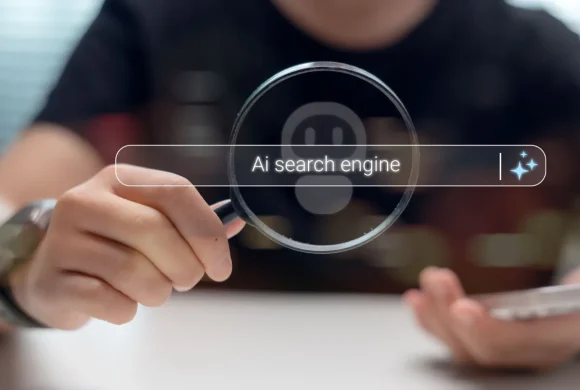FY26 Outlook: 3 Digital Marketing Trends Every Business Leader Should Act On

As we kick off the 2026 financial year, digital marketing is entering a new era.
An era driven by AI, shifting search behaviour, and a renewed demand for measurable return on investment.
At Brilliant Digital, we work with business owners and leaders across a wide range of industries, and the same questions keep surfacing:
What’s changing? What still works? Where should we be investing in marketing?
In this article, I discuss the three biggest trends shaping your digital success in FY26 and how you can stay on the right side of change.
AI Acceleration and the New Search Landscape
AI is transforming business from almost every angle. Its influence touches every interaction, from automation to communication to data collation and interpretation.
In over 30 years of business, I have not experienced a technology that reaches as far and wide as AI does, and it is only getting more advanced, faster, and easier to use.
From a digital marketing perspective, the team and I have been paying close attention to how AI is infiltrating and impacting consumer behaviour, namely how consumers use and interact with it to find what services or products they want.
The jury is no longer out, AI is well and truly a significant player in the online search market.
What is happening is what you are most likely doing yourself. Your reliance on Google is diluting. Sure, you still use Google, but more and more people are searching using AI bots such as ChatGPT, Perplexity, Gemini, or CoPilot, and they do it verbally rather than through a keyboard.
Let’s look at a few examples:
“List the best accountants for medical professionals in Sydney with investment property experience.”
“Compare steel companies in Western Sydney who can deliver custom structural fabrication for commercial builds.”
“Give me summaries of the top 3 commercial painting companies with certifications for health sector work.”
These are not keyword searches that customers type into Google. These are natural language queries to an AI bot from customers talking into their phones or other devices.
Once customers shift to voice-based search using a language bot, they don’t return to traditional search, and this trend is “trending.” As AI users stretch the bots, the searches become more complex and detailed.
What does this mean for your business from a digital marketing perspective?
It does mean change is here. SEO (search engine optimisation) was 90% of the game plan; however, the field has gotten bigger, the rules have changed, and AI is the evolution in driving customers to your business.
If you’re a Brilliant Digital client, we have good news. Your past investment in content creation, such as blogs, case studies, capability statements, and other digital communication pieces, is paying dividends and is the reason AI bots are already finding and referencing your business.
Content remains king and will continue to be the best lure on the market. However, how this content is structured, its frequency, accuracy, and human input are the keys to success in the new AI frontier.
As a client, you may have noticed a shift in your blogs and landing pages. Our team has been subtly changing your voice. You’re now much more conversational and opinionated. You answer questions and solve problems. It is about what you do, how, and why you do it, leading to industry leadership. You must be the central source of truth in your field.
Suppose your website isn’t structured to answer detailed conversational queries, and doesn’t communicate your capabilities, expertise, point of difference or have an opinion. In that case, you risk obscurity in AI-driven search results.
Carefully structured content, schema markup, strong brand clarity, and topical authority are now baseline requirements for digital visibility.
There’s a new term floating around: GEO (Generative Engine Optimisation), which specifically relates to optimising websites for AI search.
Implementing AI optimisation (GEO) for Brilliant Digital clients has been underway throughout FY25 and is an ongoing project for every client, regardless of size.
We are determined to keep our client base on the right side of change.
“Once people make the shift to voice-based search using a language bot, they don’t go back.”
Reassessing ROI Across Your Marketing Channels
As I write this article, it does feel like business is entering the 2026 financial year with an unhealthy amount of confusion.
- Geopolitical turmoil
- Unstable consumer confidence
- Uncertainty surrounding inflation and interest rates
- Delicate uneasiness in supply chain stability
- Continued issues on labour shortages
They all affect decision-making, and currently, there is no silver bullet answer. One area where businesses can make clear decisions is assessing their digital marketing, and the impact of AI on digital search behaviours is providing clarity.
Firstly, Google is losing its lustre, and the value of traditional Google Ads is beginning to decline.
Why?
When Google is employed as a search tool, the AI summaries, which appear at the top of the page, often answer a query before users scroll down to read ads and traditional Google search results.

The AI has answered the question. Is there any need to scroll down the page?
That doesn’t mean all paid traffic is dead, but you must be more strategic with your spending.
At Brilliant Digital, we’re shifting even further away from broad keyword strategies to long-tail keywords for many of our clients in the paid advertising space.
For others, shifting the budget away from search ads and toward improved brand positioning and content creation delivers a higher volume of prequalified opportunities.
The beginning of FY26 is a perfect time to audit your marketing strategy, and we can help.
- Where are the actual returns coming from?
- Which channels bring long-term leads and conversions, not just short-term traffic?
- What changes do you need to make?
“The beginning of FY26 is a great time to audit your entire marketing strategy.”
Brand Clarity is Now a Visibility Asset
Now let’s shift to the value of your digital brand.
AI-driven search doesn’t just look for keywords; it looks for context, authority, and coherence.
In a world where people ask their phones detailed, voice-driven questions, like:
“Review Australian business consultants who specialise in change management for family-run businesses”
“Which builders have experience with heritage-listed terrace renovations in Surry Hills?”
“What are the top Australian stainless steel fabrication companies for custom brewery equipment?”
… clearly, you cannot rely on vague, generic messaging.
How well your website communicates your niche, authority, and point of difference directly affects how AI platforms interpret and recommend your business.
Businesses that invest in a consistent, unified brand message and clearly articulate their expertise will rise to the top in AI-driven results. Now is a critical time to align your digital collateral. Your brand, website, and content must meet the GEO, which is the marketing priority for 2026.
If you remain generic, you will lose relevance.
“AI-driven search doesn’t just look for keywords - it looks for context, authority, and coherence. Generic messaging will disappear into the noise.”
Final Word: FY26 Requires Strategic Action, Not Complacency
AI isn’t just another tool.
AI is driving a fundamental shift in how businesses are found, understood, and trusted.
The companies that succeed in FY26 and beyond will be the ones who act today to optimise, refine, and position their digital presence for the new search revolution.
If you’re not already reviewing your performance and rethinking your digital roadmap, now is the time to talk to us.
We’re here to make sure your business doesn’t just survive. We can help you embrace AI search and make it work for you.
“If you’re not reviewing your marketing and website performance and rethinking your digital roadmap, now is the time to talk to us.”

About Deb
Meet the author
Deb Croucher is the founder of Brilliant Digital. She works directly with SME owners to create strategy-led, full-service marketing that delivers, not just in Google, but in the new world of AI-powered discovery.

Let’s Grow Your Business Together
Key Takeaways
Frequently Asked Questions – Vet Marketing & Brand Strategy
Is traditional SEO still relevant in FY26?
Yes, but it must evolve. Traditional keyword-based SEO is only part of the puzzle – conversational AI queries now demand content structured for intent and context.
Are Google Ads still worth the investment?
Not always. Their visibility is decreasing due to AI summaries. You may need to shift budget toward brand clarity, content, and long-tail targeting.
How does AI impact how customers find my business?
Customers are using tools like ChatGPT and voice assistants to ask detailed questions. If your content doesn’t directly answer these, you may be invisible to AI-powered discovery engines.
What is GEO (Generative Engine Optimisation)?
GEO is optimising for how AI engines understand and recommend content. It requires structured data, clear brand signals, and topical authority.
What does brand clarity really mean in this context?
It means your website, messaging, and content clearly communicate:
- What you do
- Who you do it for
- Why you’re different
Without this, AI and human readers won’t recognise your relevance.










